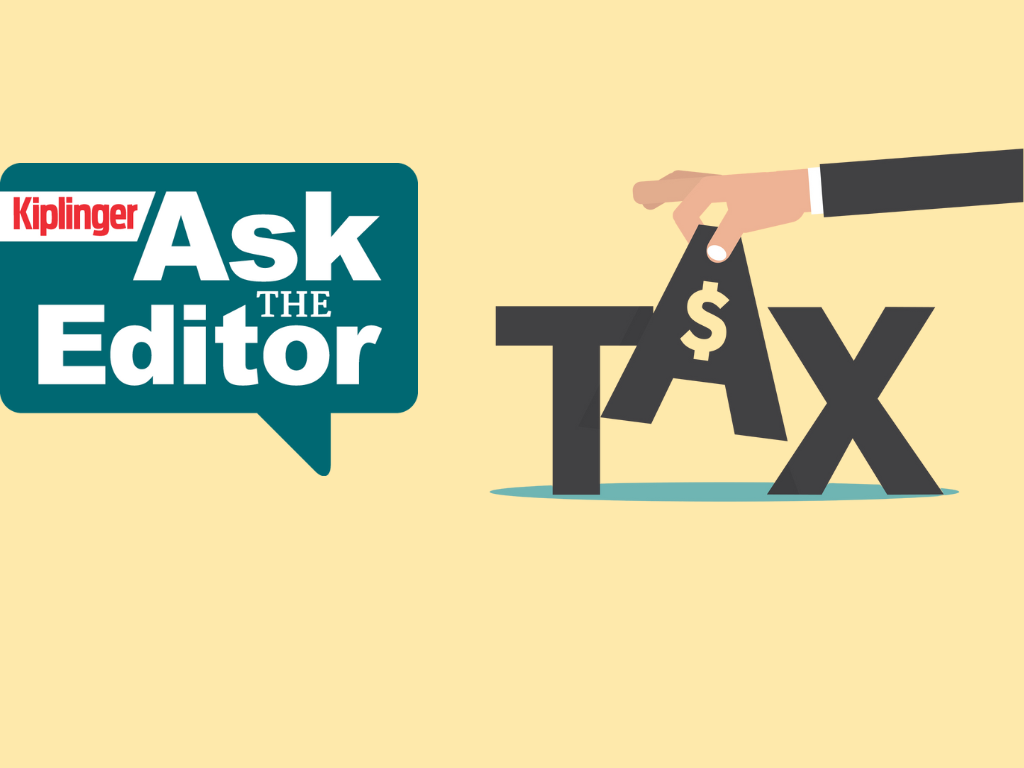4 Strategies for Older Adults to Cut Property Taxes
Before you settle your next property tax bill, make sure you're taking full advantage of these tax breaks for older homeowners across the US.


Profit and prosper with the best of Kiplinger's advice on investing, taxes, retirement, personal finance and much more. Delivered daily. Enter your email in the box and click Sign Me Up.
You are now subscribed
Your newsletter sign-up was successful
Want to add more newsletters?

Delivered daily
Kiplinger Today
Profit and prosper with the best of Kiplinger's advice on investing, taxes, retirement, personal finance and much more delivered daily. Smart money moves start here.

Sent five days a week
Kiplinger A Step Ahead
Get practical help to make better financial decisions in your everyday life, from spending to savings on top deals.

Delivered daily
Kiplinger Closing Bell
Get today's biggest financial and investing headlines delivered to your inbox every day the U.S. stock market is open.

Sent twice a week
Kiplinger Adviser Intel
Financial pros across the country share best practices and fresh tactics to preserve and grow your wealth.

Delivered weekly
Kiplinger Tax Tips
Trim your federal and state tax bills with practical tax-planning and tax-cutting strategies.

Sent twice a week
Kiplinger Retirement Tips
Your twice-a-week guide to planning and enjoying a financially secure and richly rewarding retirement

Sent bimonthly.
Kiplinger Adviser Angle
Insights for advisers, wealth managers and other financial professionals.

Sent twice a week
Kiplinger Investing Weekly
Your twice-a-week roundup of promising stocks, funds, companies and industries you should consider, ones you should avoid, and why.

Sent weekly for six weeks
Kiplinger Invest for Retirement
Your step-by-step six-part series on how to invest for retirement, from devising a successful strategy to exactly which investments to choose.
More than three-quarters of Americans 50 and older say they want to remain in their homes after they retire, but sharp increases in property taxes have made aging in place unaffordable.
Unlike income taxes, which often decline in retirement, property taxes are based on the value of your home — and in many parts of the country, assessed values have skyrocketed in recent years. Median property taxes rose by an average of 10.4% between 2021 and 2023, according to an analysis of the latest data available by LendingTree, an online marketplace for consumer loans. The median property tax in 2023 was nearly $3,000 ($2,969), but median property taxes in 50 metropolitan areas ranged from $1,091 to nearly $10,000, according to LendingTree.
Before writing a check for your next property tax bill, make sure you take full advantage of property tax relief programs offered by your state or locality. While more than 9 million Americans likely qualify for property tax relief, only about 8% apply for it, according to the AARP. “Many aren’t aware these programs exist or assume they’re not going to qualify,” says Nicole Heckman, vice president of well-being for the AARP Foundation.
From just $107.88 $24.99 for Kiplinger Personal Finance
Become a smarter, better informed investor. Subscribe from just $107.88 $24.99, plus get up to 4 Special Issues

Sign up for Kiplinger’s Free Newsletters
Profit and prosper with the best of expert advice on investing, taxes, retirement, personal finance and more - straight to your e-mail.
Profit and prosper with the best of expert advice - straight to your e-mail.
The types of property tax relief available vary, not only by state but by individual counties and jurisdictions. Many states and jurisdictions offer expanded relief to homeowners who are 65 or older; some offer breaks to homeowners who are 61 and older. Veterans and residents with disabilities may also qualify for a reduction in their property taxes. While eligibility is often income-based, the income thresholds “can be pretty expansive,” Heckman says, so don’t assume you earn too much to qualify. In New Jersey, for example, homeowners with incomes of up to $500,000 are eligible for reimbursement of a portion of their property tax bill.
Tax relief isn’t automatic. In most cases, you must fill out an application and file it by a deadline set by your locality or state. Some jurisdictions require you to apply in person. Other states and localities allow you to apply online, but that can be challenging for older adults who don’t have broadband internet, Heckman says.
The AARP Foundation’s Property Tax Aide program, now in its fifth year, allows homeowners to research more than 140 programs in 50 states and Washington, D.C. Users can find details on eligibility, deadlines and where to get help. The average amount of relief provided through the program is $400, but some users have saved up to $1,000, Heckman says. Many states allow eligible homeowners to apply for up to three years of back tax relief, she says. “That can be a significant credit or refund.”
Some types of relief states and localities offer homeowners:
1. Tax credits and refunds
More than a dozen states offer property tax credits or refunds to eligible older adults in amounts ranging from $250 to $2,730. Pennsylvania provides rebates ranging from $380 to $1,000 for eligible older and disabled residents. Tennessee refunds all or a portion of property taxes paid by eligible residents.
Minnesota provides two types of property tax refunds: one based on homeowners’ income and the amount of their property taxes, and another based on how much residents’ property taxes have increased. (Some residents qualify for both, and the program isn’t limited to older adults.) Cindy Rieck, 68, of Pequot Lakes, Minn., whose home has nearly doubled in value since she purchased it in 2007, says she received a refund of $1,200 in 2024.
2. Expanded homestead exemption
Property taxes are based on the assessed value of your home, which may differ from its appraised or market value. A homestead exemption lowers the assessment, thus reducing your property tax bill. Most states offer some kind of homestead exemption for residents, but many states provide an additional homestead exemption for older adults.
Florida, for example, allows residents to exempt up to $50,000 of their home’s assessed value from property taxes (which will increase with the rate of inflation starting in 2025), but jurisdictions in the state have the option of providing an additional $50,000 exemption to eligible homeowners 65 and older.
Texas recently increased its homestead exemption to $140,000 for all residents. The state provides an additional $60,000 exemption for residents age 65 or older, for a total combined homestead exemption of $200,000. Texas now allows individual jurisdictions to add $3,000 to that amount.
3. Assessment freeze
In Arizona, homeowners ages 65 or older who have lived in their primary home for at least two years and meet income limits can have their property’s valuation frozen for three years. New Jersey has a “senior freeze” program that reimburses property tax increases for eligible residents who have owned their homes for at least three years.
4. Tax deferral
Illinois allows eligible homeowners 65 and older to defer up to $7,500 of property taxes on their principal residence. California, Maine, Minnesota, Vermont and Washington also allow eligible older adults to defer property taxes.
If you sign up for deferral, the state or locality will place a lien on your home; the taxes must be paid, usually with interest, after you die or sell the home. That’s important to consider when planning your estate. If your heirs sell the home, the back taxes will reduce the amount they’ll receive from the proceeds, and if they want to keep it, they’ll be on the hook for the taxes you deferred. “If you can afford it, you may decide you’d rather pay the tax now and not have something your heirs will have to worry about when they sell the property,” says Jared Walczak, vice president of state projects at the Tax Foundation in Washington, D.C., a tax-policy research organization.
Other options to cut your tax bill
Applying for property tax relief is just one way to lower your tax bill. Other options that may be available to you:
Claim a deduction
The One Big Beautiful Bill Act, signed into law in July, allows homeowners to deduct up to $40,000 in state and local taxes, up from a cap of $10,000. The provision takes effect in 2025 and expires in 2029. The legislation also expanded the standard deduction for eligible taxpayers 65 and older, so for many older adults, claiming the standard deduction will still provide the lower tax bill. However, if you live in a high-tax state and have other deductible expenses — large charitable contributions, for example — it’s worth running the numbers with your tax preparer or on a tax software program to determine whether you should itemize on your 2025 tax return.
Challenge your property tax bill
If you believe your assessment was inaccurate or outdated, you may be able to lower it by filing an appeal. Review your property’s record card, usually available on your locality’s website or by request. If you find an obvious error — four bedrooms instead of two, for example — your assessor may agree to lower the assessment on the spot.
If the information on your property’s record card is correct but you believe your assessment was higher than those for comparable homes in your neighborhood, you can use that information to file an appeal. Check your local government’s website for deadlines and procedures. Realtor.com offers a tool that will provide you with an estimate of the market value of your home, along with estimated values of other homes in your neighborhood. The tool is free but you must create an account to use it.
Note: This item first appeared in Kiplinger Retirement Report, our popular monthly periodical that covers key concerns of affluent older Americans who are retired or preparing for retirement. Subscribe for retirement advice that’s right on the money.
Related content
Profit and prosper with the best of Kiplinger's advice on investing, taxes, retirement, personal finance and much more. Delivered daily. Enter your email in the box and click Sign Me Up.

Block joined Kiplinger in June 2012 from USA Today, where she was a reporter and personal finance columnist for more than 15 years. Prior to that, she worked for the Akron Beacon-Journal and Dow Jones Newswires. In 1993, she was a Knight-Bagehot fellow in economics and business journalism at the Columbia University Graduate School of Journalism. She has a BA in communications from Bethany College in Bethany, W.Va.
-
 Dow Loses 821 Points to Open Nvidia Week: Stock Market Today
Dow Loses 821 Points to Open Nvidia Week: Stock Market TodayU.S. stock market indexes reflect global uncertainty about artificial intelligence and Trump administration trade policy.
-
 Nvidia Earnings: Live Updates and Commentary February 2026
Nvidia Earnings: Live Updates and Commentary February 2026Nvidia's earnings event is just days away and Wall Street's attention is zeroed in on the AI bellwether's fourth-quarter results.
-
 I Thought My Retirement Was Set — Until I Answered These 3 Questions
I Thought My Retirement Was Set — Until I Answered These 3 QuestionsI'm a retirement writer. Three deceptively simple questions helped me focus my retirement and life priorities.
-
 10 Things to Know About Decluttering
10 Things to Know About DeclutteringYou’ve spent a lifetime amassing your stuff. Here’s how to get rid of it.
-
 Ask the Editor, February 20: Questions on Tax Breaks for Caregivers
Ask the Editor, February 20: Questions on Tax Breaks for CaregiversAsk the Editor In this week's Ask the Editor Q&A, Joy Taylor answers questions on tax breaks for caregivers
-
 Ask the Editor, February 13: More Questions on IRAs
Ask the Editor, February 13: More Questions on IRAsAsk the Editor In this week's Ask the Editor Q&A, Joy Taylor answers questions on IRAs
-
 Ask the Editor, February 6: Questions on Federal Income Tax Deductions
Ask the Editor, February 6: Questions on Federal Income Tax DeductionsAsk the Editor In this week's Ask the Editor Q&A, Joy Taylor answers questions on federal income tax deductions
-
 Ask the Editor, January 30: Questions on Social Security Benefits Taxation
Ask the Editor, January 30: Questions on Social Security Benefits TaxationAsk the Editor In this week's Ask the Editor Q&A, Joy Taylor answers questions on the taxation of Social Security benefits
-
 It's Time to Rethink What 'Aging Well' Means
It's Time to Rethink What 'Aging Well' MeansDon’t fall into the trap of thinking there is a "right way" to age. Here's how to reframe aging in a healthy, achievable way.
-
 The New Rules of Retirement
The New Rules of RetirementPopular guidelines about how to save, invest and spend need to be updated and personalized to ensure you'll never run out of money.
-
 Ask the Tax Editor, January 23: Questions on Residential Rental Property
Ask the Tax Editor, January 23: Questions on Residential Rental PropertyAsk the Editor In this week's Ask the Editor Q&A, Joy Taylor answers questions on reporting income and loss from residential rental property.